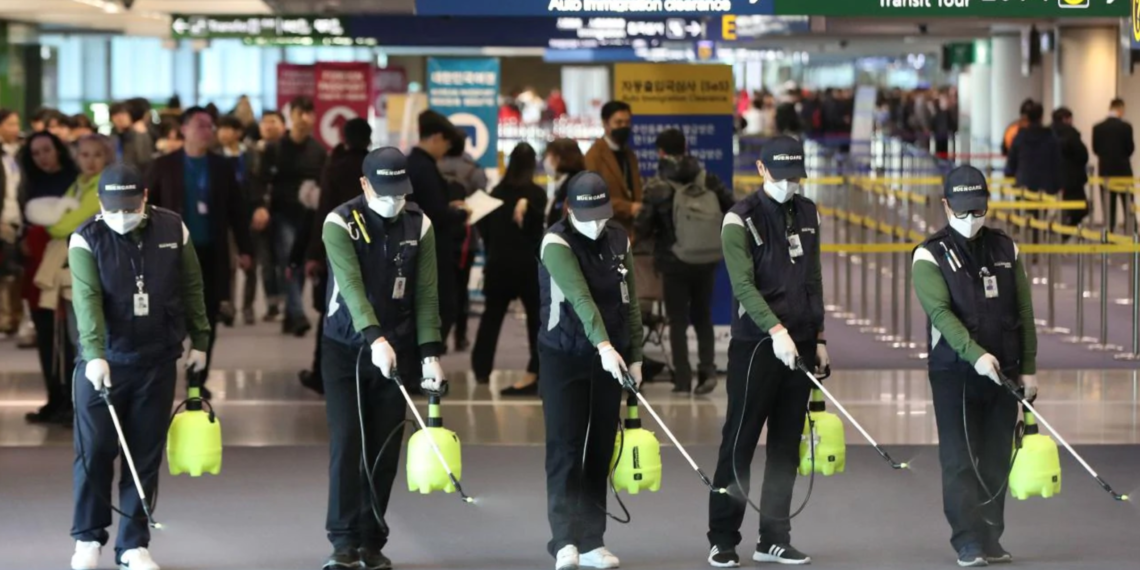With over 75,000 people infected and the death toll in China rising almost daily, the new coronavirus outbreak has the world in a panic. Much of the global fear is driven by what the WHO calls “a massive ‘infodemic,’” referring to an overabundance of information, some accurate and some not, that makes it hard to find trustworthy sources and reliable guidance.
As part of a group of academics researching human coronaviruses for the past two decades, I’m optimistic and want to dispel unnecessary reason for panic. Let’s start by separating fact from fright.
The WHO has now dubbed the coronavirus disease COVID-19. You should be on the lookout for cold-like symptoms. Particular attention should be paid by those who have traveled to an affected area or have been in contact with someone infected by the virus.
It seems that COVID-19 is affecting the elderly more and especially those with co-morbidity such as heart diseases or diabetes. In addition, those with low immune systems are at higher risk of infection.
How Deadly is Coronavirus?
On February 19, the WHO confirmed that coronavirus had infected about 75,200 people globally while it killed 2009 people. The popular press has labeled the outbreak as “deadlier than the 2003 SARS coronavirus outbreak.”
'Scaremongering is rampant'
Normally bustling century-old Chinatowns from Melbourne to San Francisco are struggling as the stigma of coronavirus hurts businesseshttps://t.co/RUdGou3EgX pic.twitter.com/moAToYq4RL
— AFP News Agency (@AFP) February 20, 2020
However, even though the loss of any life is tragic, we need to look at this outbreak in perspective. Compared to the mortality rates for the 2003 SARS and 2012 MERS outbreaks, with about 10 and 34 percent respectively, the current coronavirus is not nearly as deadly, with a mortality rate of just under 2 percent.
How Likely Is an Epidemic?
With SARS spreading to 29 countries, scientists called it the “first pandemic of the 21st century.” SARS showed that in the current age of globalization and heavy international air travel, an infectious disease could rapidly spread around the world.
Even though human-to-human transmission has been reported with the current coronavirus, it is tricky to conclude the virus spreads easily. Coronavirus has a reported reproduction number of two, meaning that each infected person can infect two others. This also means the disease has epidemic potential, defined as an increase, often sudden, in the number of disease cases above what is normally expected.
A pandemic, on the other hand, is an ongoing epidemic on two or more continents. The 1918 Spanish flu, for example, had a comparable reproduction number as the current coronavirus but resulted in the death of between 50-100 million people.
As of February 17, the majority of confirmed cases have been reported in China, with only three deaths outside the country. Keeping in mind that Wuhan has a population of 11 million people, does this support the definition of an epidemic? Maybe.
Does this support the hypothesis of effective human-to-human transmission? I am not yet convinced. The vast majority of confirmed cases have been associated with close contact, often members of the same family or health care workers.
Already, on February 16, the WHO reported no new cases of coronavirus in the past 24 hours. Is this the beginning of the containment? Probably not yet.
What Has Been Done?
The fear that the virus is new and dangerous and that it replicates rapidly are valid concerns. However, research groups all over the world are working quickly and closely to understand the virus.
Bear in mind that this particular virus is from the same family as SARS-CoV that caused SARS in 2003 and the MERS-CoV that caused MERS in 2015. Research done on those viruses can be extrapolated to the current coronavirus, allowing for advancements in studies of the new virus to progress much faster.

Even though no specific antiviral or vaccine has been developed for SARS, MERS, or the novel coronavirus, some drugs and pre-clinical vaccines have been developed. With recent reports that SARS and the new coronavirus bind to and enter human cells in the same way, pre-existing research could prove useful. Moreover, as with other new viral diseases, research groups are testing existing drugs as treatment options.
There have already been dramatic breakthroughs in the search for a cure. The genetic sequence has been determined, which allows scientists to use the genetic material of the virus to look at developing antivirals and other forms of treatment.
Of equal importance, various groups have managed to grow the virus in an artificial environment in the laboratory. This allows large scale preparation of the virus for antiviral and vaccine studies. The importance of these developments cannot be emphasized enough.
How Worried Should We Be?
From a health authority perspective, increased active surveillance, early detection of infected patients, followed by isolation and case management, together with effective contact tracing should be effective in preventing the uncontrolled spread of COVID-2019.
From a personal perspective, you can minimize the risk of infection by practicing good personal hygiene including respiratory hygiene and washing or sanitizing your hands frequently.
As general precautions, ensure general hygiene measures when visiting markets with live animals and maintain social distancing when possible, especially in areas confirmed to have positive cases of COVID-2019.
Then for the big question: when does the effect of the virus come to an end? Will it just die out? In 2003, SARS was removed from the human population in about six months purely by quarantining infected individuals. It is still too early to tell whether the decreased numbers reported lately for COVID-2019 is the start of the end of this outbreak. What we do know is that, as with SARS, only a joint global effort by researchers, healthcare practitioners, and governments will be effective in containing this virus.
Disclaimer: The views and opinions expressed here are those of the author and do not necessarily reflect the editorial position of The Globe Post.























